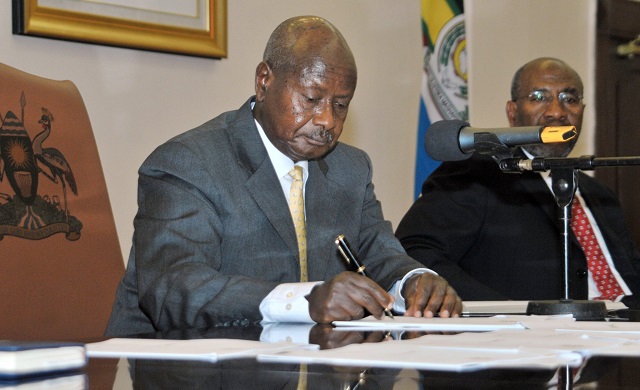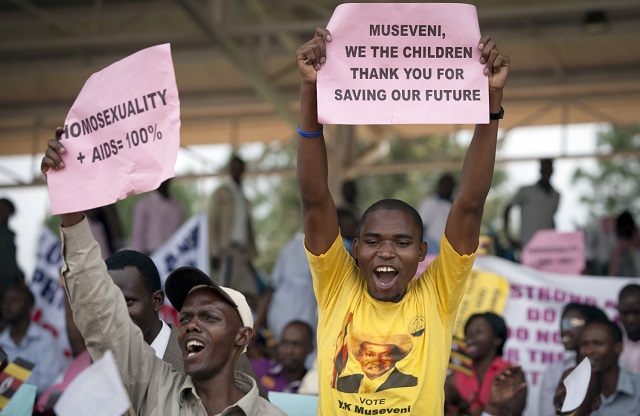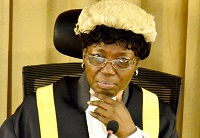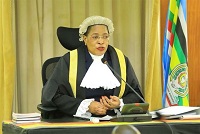
Constitutional Court ruling puts Uganda on path to pariah nation
COVER STORY | THE INDEPENDENT | When on April 03 the Constitutional Court in Kampala upheld the Anti-Homosexuality Act, it set in motion local and international moves that are irreversible in the short term and could impact heavily on the social, political and economic life of Ugandans.
The justices of the Constitutional Court declined to nullify the Anti-homosexuality Act 2023 in its entirety as sought by the petitioners. They also declined to slap a permanent injunction against its enforcement as sought by the petitioners.
The Anti-homosexuality Act (AHA) that President Yoweri Museveni signed into law on May 26, 2023 prescribes at least seven offenses related to homosexuality. They range from consensual homosexuality which attracts a life sentence, which attracts a death sentence, attempted homosexuality which attracts a 10 year jail term, and the publication of identities of victims of homosexuality which attracts a fine of Shs5 million, and child homosexuality. The law also prescribes related offenses and there penalties; namely procuring and grooming children, providing premises, participating in marriage, promoting by persuading, advertising, offering enticements and support, failure to report acts of homosexuality or its facilitation, and falsely accusing someone of homosexuality.
But the Constitutional Court ruling removed some offenses such as those criminalising the owner of premises being for homosexuality and failure to report homosexuality.
The court’s 200-page long judgment read by Deputy Chief Justice Richard Buteera also displayed a delicate balance and awareness of contradictory expectations, local and international.
The court’s decision in totality places Uganda among just seven countries out of the 195 countries in the world that have the death penalty as a sentence for the crime of homosexuality on their statute books. The questions that Ugandans will be asking in the coming days, weeks, and months is whether, attaining this singular distinction is worth the social, political and economic challenge they might have to endure because of parliament’s enactment of the law and President Yoweri Museveni assent to it.
When President Museveni signed the AHA into law in May 2023, it was internationally dubbed “the world’s most stringent anti-gay statutes”. The proposed death penalty for aggravated homosexuality earned the bill the name ‘Kill Gay Bill’ and Uganda earned the notoriety of being “the world’s worst place to be gay”.
Already, the U.S. ended Uganda’s eligibility to export to the U.S. market under the African Growth and Opportunity Act (AGOA) effective January 1, 2024 due to failure to repeal the Anti-homosexuality Act. In the 12 months to June 2023, Uganda’s exports to the US under Agoa amounted to $8.2 million, data from the U.S. Department of Commerce shows.
The U.S. also reduced direct government-to-government funding to programs implemented with Uganda, including a US$15 million project in Bio-Defense and US$5 million from the U.S President’s Emergency Plan for AIDS Relief (PEPFAR).
Earlier, on December 4, 2023 U.S. Secretary of State Blinken announced the expansion of the visa restriction policy to include current or former Ugandans believed to be responsible for undermining the democratic process in Uganda or repressing members of marginalized or vulnerable populations such as activists, human rights defenders, journalists, LGBTQI+ persons, and civil society organisers.
On December 8, 2023 the U.S. Department of the Treasury designated Johnson Byabashaija, the head of the Uganda Prisons Service, for leading a government entity allegedly engaged in serious human rights abuse, torture and other cruel, inhuman or degrading treatment or punishment against prisoners held within UPS facilities.
The U.S also issued business advisories on October 23, 2023 to highlight heightened risks for U.S. businesses, individuals, and other persons, including health service providers, members of academic institutions, and investors conducting or contemplating conducting business in Uganda. It also warned its citizens they could be prosecuted and subjected to imprisonment if they travel to Uganda.
The U.S also backed the World Bank actions against Uganda. The World Bank in August 2023 suspended future loans to Uganda after over 170 CSOs warned the AHA breached the Bank’s Environmental and Social Framework that prohibits it from supporting programs that discriminate against vulnerable groups.
Uganda is not alone in being swept up in anti-homosexuality fervour backed by American-based Christian fundamentalists. Ghana’s parliament in February passed an Anti-homosexuality Bill similar to that of Uganda called the Human Sexual Rights and Family Values Act. But President Nana Akufo-Addo has previously hinted that Ghana would not backslide on its longstanding record on human rights observance. Ghana’s Ministry of Finance has also published an internal memo stating that “in total, Ghana is likely to lose US$3.8 billion in World Bank Financing over the next five to six years” because of the Bill.
Malawi, Zambia, and Senegal and other countries are in various stages of pushing anti-homosexuality legislation. But even the Islamic fundamentalist regimes such as Pakistan, Saudi Arabia, and Nigeria do not have laws as harsh as that of Uganda, observers say. Based on this, most commentators are asking why Uganda fell over the edge in anti-homosexuality legislation and whether it is worth the price the country and its citizens could end up paying.
Cultural and societal norms
Butera said the Court was duty bound consider Uganda’s cultural and societal norms. Butera who was flanked by four other justices added that the court’s primary aim was also to safeguard children and vulnerable members of society. He drew international attention when he referenced a recent decision in the U.S. Supreme Court which upheld controversial anti-abortion laws in that country.

On June 24, the U.S. Supreme Court ended constitutional protections for the right to abortion with its decision in Dobbs v. Jackson Women’s Health Organisation that overturned the historical 1973 precedents of Roe v. Wade.
In that ruling, the U.S. Supreme Court used a generally held view that all methods of constitutional interpretation look to the past and ask whether a right being sought or defended is “deeply rooted in this Nation’s history and tradition”.
Butera’s referencing the U.S Supreme Court decision was immediately pounced on.
“It is deeply disturbing to see how Uganda’s attack on human rights and evidence-based public health is influenced by and coordinated with extremist views in the U.S. and on the U.S. Supreme Court,” said Mitchell Warren, the executive director of the AIDS Vaccine Advocacy Coalition (AVAC) on the organisation’s website. “This is a staggering message that a rights-based approach to healthcare is imperiled in many countries by reactionary movements that are gaining strength from each other.”
“We must stand up and fight back against these laws everywhere or we will never end any epidemic,” he added.
Mitchell Warren was referring to the influence of the American fundamentalist Christian groups on the Anti-homosexuality movement in Uganda.
Foreign influences
The issue of foreign influence on the debate on homosexuality in Uganda is no new.
The current push for anti-homosexuality legislation has been traced to a March 2009 conference under the theme ‘Exposing the Homosexual Agenda’ organised by Family Life Network at State House Entebbe which was headlined by anti-gay and ex-gay American preachers and the March 2014 National Parade and Thanksgiving Prayer Rally organised by the Inter-Religious and Cultural Leaders Alliance to thank President Museveni for assenting to the anti-homosexuality law.
But while conservative western foreigners, particularly the American Christian Rightists, actively catalyse recriminalisation of homosexuality by heightening its social-cultural disapproval in Ugandan society, the pro-homosexuality camp use diplomatic, military, and economic sanctions to pressure Uganda’s government to allow LGBTQI+ activities and their promotion and to reject anti-homosexuality legislation. One side’s action is often seen as a push back against the growing influence of the other.
The United Kingdom, United States of America, Sweden, Denmark, The Netherlands and Ireland have previously either withdrawn or redirected their foreign aid from the public government fund to what they perceive to be progressive civil society organisations (CSOs).
Previously when the Uganda Anti-Homosexuality Act was passed in May 2023, U.S. President Jose Biden called it “a tragic violation of universal human rights one that is not worthy of the Ugandan people”.
Significantly, he said the “shameful Act is the latest development in an alarming trend of human rights abuses and corruption in Uganda” and another sign of democratic backsliding.
He said Ugandans, U.S. government personnel in Uganda, staff of implementing partners, tourists, members of the business community, and others are in danger.
He immediately directed the U.S. National Security Council to evaluate the implications of the law on all aspects of U.S. engagement with Uganda, including U.S. President’s Emergency Plan for AIDS Relief (PEPFAR), other forms of assistance and investments, and Uganda’s eligibility for AGOA. He ordered sanctions and restriction of entry into the United States against anyone involved in serious human rights abuses or corruption.
“Since the Anti-Homosexuality Act was introduced, reports of violence and discrimination targeting Ugandans who are or are perceived to be LGBTQI+ are on the rise,” said.

According to his statement innocent Ugandans were fearful of going to hospitals, clinics, or other establishments to receive life-saving medical care lest they be targeted by hateful reprisals. Some, he said, had been evicted from their homes or fired from their jobs.
“And the prospect of graver threats including lengthy prison sentences, violence, abuse threatens any number of Ugandans who want nothing more than to live their lives in safety and freedom,” he said.
This time, U.S. Secretary of State Antony J. Blinken has dismissed the announcement that some provisions of the Anti-Homosexuality Act have been removed by the Constitutional Court as “a small and insufficient step”.
“The remaining provisions of the AHA pose grave threats to the Ugandan people, especially LGBTQI+ Ugandans and their allies, undermine public health, clamp down on civic space, damage Uganda’s international reputation, and harm efforts to increase foreign investment,” he said.
“The United States continues to be deeply concerned by reports of human rights abuses in Uganda, including against the LGBTQI+ community,” he said.
Homosexuality and politics
Homosexuality has also intermingled with politics in Uganda and elsewhere.
In Ghana, as in Uganda, the backers of the AHA are peddling as an issue of sovereignty.
“Ghana is not the 51st State of the United States or any other Western state. In the context of Ghana, we should not give rights to a person to practice a sexual preference other than what is natural and acceptable by society,” said Member of Parliament Sam George, the driving force behind Ghana’s harsh anti-LGBTQ legislation, to CNN.

It has been pointed out how, while she was Speaker of Parliament, Rebecca Kadaga gained popularity with her famous rebuttal to John Baird, the Canadian Minister of Foreign Affairs during the 127th Inter-Parliamentary Union’s Assembly held in Quebec in October 2012.
The Canadian minister criticised Uganda’s parliament for entertaining of the Anti-Homosexuality Bill (2009).
In response, Kadaga told off her host by reminding him that Uganda was a sovereign country.
“When we came for this Assembly, to which we were invited, we expected respect for our sovereignty, our values and our country. I, therefore on behalf of the Ugandan delegation, and indeed the people of Uganda, protest in the strongest terms the arrogance exhibited by the Foreign Minister of Canada, who spent most of his time attacking Uganda and promoting homosexuality.
“If homosexuality is a value for the people of Canada, they should not seek to force Uganda to embrace it. We are not a colony or protectorate of Canada,” she told the assembly.

Recently, when faced with potentially damaging leaks of alleged false-accounting and misuse of the parliamentary budget, including using subordinate account to siphon monies, Speaker Anita Annet Among raised the anti-homosexuality boogey. She said she was being witch hunted for enabling the passing of the Anti-homosexuality Bill.
While addressing the Parliamentary Plenary on March 15, Speaker Among, refused to address the allegations directly and dubbed them hearsay.
“I will never, and I am saying never give you an answer on hearsay,” she said, “I have said no to bum-shafting. I will not,” she said.
But the Leader of Opposition, Joel Senyonyi who raised the issue later told journalists that the Speaker was hiding being the Anti-homosexuality law to dodge the accountability issue.
“Stop hiding under the Anti-homosexuality,” he said.
Renowned Ugandan medical anthropologist, Stella Nyanzi and social-political justice lawyer, Andrew Karamagi have written extensively on the topic of political appropriation of homosexuality. In a paper entitled “The social-political dynamics of the anti-homosexuality legislation in Uganda” published in 2015 the duo said “Political appropriation of the debate politicised homosexuality”.
“Contestants in the 2011 elections declared their stance. Seeking cheap popularity, some promised to work towards passing the Anti-Homosexuality Bill if elected into Parliament. Predictably, many contestants standing on the NRM card denigrated homosexuality based on conservative religious and cultural values and a homophobic patriotic nationalism.
They say the widely publicised presidential signing of the anti-homosexuality law on February 24, 2014 was a performance aimed at boosting Museveni’s popularity among Ugandan voters.
Museveni used it to reiterate Uganda’s sovereignty, thereby building solidarity with other anticolonialist and antineo-imperialist opponents of homosexuality, particularly in Africa even as it antagonised some bilateral partners opposed to criminalising homosexuality.
Interestingly, later a leaked letter by President Yoweri Museveni dated December 28, 2014 revealed that Museveni had, in fact, blamed Kadaga for failing to listen to his advice to shelve the Anti-homosexuality Bill or control the fervent anti-homosexuality camp which she led within Parliament. At the time, there was widespread speculation that Kadaga aimed to contest for the presidency of Uganda in 2016.
According to Nyanzi and Karamagi, Uganda’s anti-homo-sexuality legislation also needs to be analysed as part of the wider national political dynamics of governance and democracy.
“Anti-homosexuality legislation does not develop in a vacuum,” according to Nyanzi and Karamagi.
“Legacies of colonial laws aside, scholars associate homophobia with two main factors – conservative traditional culture and dominant religious interpretations,” they say.
The Anti-Homosexuality Bill was first tabled in Uganda’s Parliament on October 14, 2009 by David Bahati, a born-again Anglican representative of Ndorwa West as a culmination of conservative Christian rightists’ mobilising and organising.
Writing about such developments, scholars have described describe how conservative pro-natalist family values have colluded with growing homophobia against increasing local LGBTIQ movement visibility, organising and support.
They say the consequent tensions were manipulated by local politicians interested in advancing their political agendas in an undemocratic regime.
They say while homophobia spurs the politics of homosexuality in Uganda, there are three alternative interpretations of why homosexuality is being mobilised as a platform for strategic bargaining between different actors.
Firstly, homosexuality presents an easy tool that rogue regimes marshal to divert attention (criticism) away from domestic governance failure(s). That the anti-homosexuality crusade easily gains populist support from those who stand to gain from the status quo of male dominance since homosexuality deflates misogyny and presents a plausible threat to the patriarchal social order. Finally, that the growing momentum of a movement for equal sexual citizenship galvanises political power, public visibility and transgressive activism.
 The Independent Uganda: You get the Truth we Pay the Price
The Independent Uganda: You get the Truth we Pay the Price



